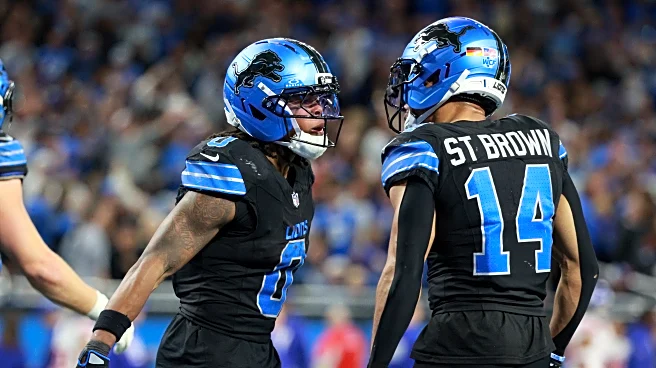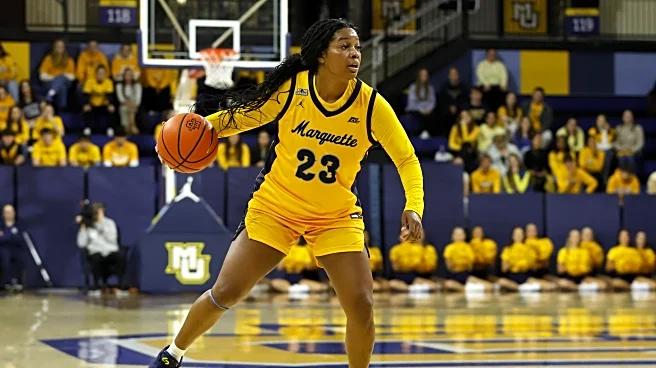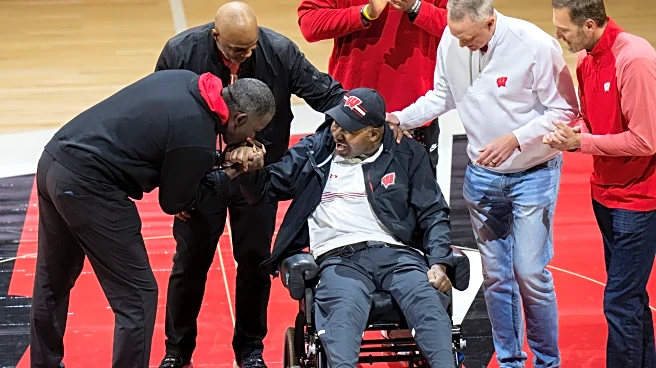Barely a win is still a win.
The Detroit Lions needed overtime to overcome the New York Giants, but one play was all it took to secure the lead and the eventual win. The Lions trailed for most of the day
in a game many viewed as a cakewalk, but the Jameis Winston-led Giants put up a fight throughout the game—nothing comes easy in the NFL. Despite a mixed performance from the roster, the Lions still walk away from this Week 12 tilt with a win. With the Green Bay Packers due up next on Thanksgiving, the Lions will need to rekindle some of this magic against one of the NFC’s best.
Which players stood out in the Lions’ win over the Giants?
Ultimate Winner: Jahmyr Gibbs, RB
The Lions flat-out do not win this game without Jahmyr Gibbs. The running back put the team on his back in every facet. Running the ball? How about TWO HUNDRED AND NINETEEN YARDS on 15 carries and two touchdowns, one of which came on the first play of overtime in a game-winning effort. If the run game is not to your liking, how about a complementary 45 yards and a touchdown on 11 receptions, including an always-deadly Texas route.
We have always known that Gibbs can take over a game with his electric skillset, but this was arguably his magnum opus of dominance. When the Lions needed a play, it was Gibbs to the rescue. His ability to turn modest gains into sprinting touchdowns is nearly unmatched in the NFL: he has the speed of Jameson Williams with the rushing ability of Saquon Barkley. It is dangerous to throw around these words, but this performance was Barry Sanders-esque.
Winner and loser: Amon-Ra St. Brown, WR
It’s rare to list a receiver with over 149 yards and a touchdown as a loser, but you would be hard pressed to call this an overwhelmingly great day for St. Brown. The normally sure-handed receiver had two killer drops on Sunday. The first was an easy reception that turned into a three-and-out—not the end of the world, but a troubling trend. However, his second drop almost cost the Lions the game. On a third down deep in Giants territory, the ball bounced up off St. Brown’s mitts and into the arms of Jevon Holland. At the time, the Lions were trailing 20-17, so that drop likely cost Detroit a field goal (which would have tied the game) or a touchdown (which would have given them the lead). Instead, the Lions walked away from a 10-play, 70-yard drive with zero points.
Assuming these plays are recorded as drops, this will bring St. Brown’s season total to seven. His career-high came in 2023 with eight drops, but that also came on a whopping 164 targets, a number St. Brown is unlikely to approach with six games left in the season. For some reason, St. Brown’s hands are simply not up to par this season. While he is still a stellar receiver and Goff’s go-to option, the drops have come an inopportune times. That being said, he still delivered some clutch catches to help facilitate the Lions’ comeback—hard to complain too much about that (I say as I spent most of this section complaining).
Losers: Pass rush and coverage
Under normal circumstances, the return of starting cornerback D.J. Reed would bolster a defense that had already been playing at a high level. Instead, the Lions took a significant step back against a Giants offense trotting out backups at multiple positions.
After recording five sacks against the Vikings in Week 9, the Lions pass rush has not-so-quietly fallen off a cliff. The only players bringing consistent pressure are Aidan Hutchinson and Roy Lopez. Names like Al-Quadin Muhammad, Alim McNeill, and Tyleik Williams have been largely absent in terms of rushing the passer. Over the previous three games, the Lions have just four sacks from Lopez (1.0), Hutchinson (1.5), and Brian Branch (1.5) despite facing some exploitable offensive lines. On Sunday, Jameis Winston had far too much time to operate, dicing up the secondary with easy passes. During the rare occasion that he was pressured, he typically managed to elude the would-be tackler. The first sack of the game, courtesy of Hutchinson, came on the final play of overtime, so while it was a clutch moment, it was also long overdue.
Wan’Dale Robinson finished the game with a season-high 156 receiving yards, while Tyrone Tracy, Isaiah Hodgins, and Theo Johnson also chimed in for some explosive plays. The Giants had 517 yards of total offense, over 395 of which came through the air. Amik Robertson in particular was victimized for over 100 passing yards in arguably his worst outing of the year. The Giants receivers were wide open far too often, a combination of too much time in the pocket for Winston and poor coverage from the defenders.
Loser: Brian Branch, S
Football is a physical sport, and it is only natural that a defender will get dinged for an illegal hit over the course of a season. One is a random, two is a coincidence, three is a trend. For Brian Branch, we are well beyond trend-setting.
Branch has been fined four times during the 2025 season alone, and a fifth fine is likely in the mail. In the first quarter, Branch launched himself into Wan’Dale Robinson in a helmet-to-helmet collision. The play drew a flag and helped the Giants put a field goal on the board.
Over the course of his career, Branch has been fined five times for helmet-related infractions, as well as miscellaneous fines for taunting, fighting, and a hit on a defenseless receiver. The fact is obvious: Branch is not learning from his mistakes. These plays are not just costing Branch’s bank account, they are costing the Lions field position and if the trend continues, potentially a starter. The NFL has not shied away from punishing repeat offenders and going forward, Branch will be one bad hit away from an ejection and/or suspension.
Branch was once viewed as a sure-fire extension candidate, but how much would the team be willing to spend on a player incurring illegal and reckless hits on a near weekly basis? Coupled with his coverage taking a step back in 2025 (he was on the hook for a few of the Giants’ deep shots), the Lions will have a difficult decision to make regarding Branch and his contract. As for Branch himself, he needs to clean up his game, but it might be too late to shake this label.
Winner and loser: Thomas Harper, S
Harper was brought in as safety depth during roster cuts, but he has stepped up following the absence of Kerby Joseph at deep safety. Sunday’s start against the Giants was perhaps his worst of the season in terms of coverage (he was credited with a touchdown allowed), but he made up for it with an interception at a pivotal moment in the fourth quarter. In particular, it came against Robinson, a player that had been carving up the Lions secondary. Sure, it led to a three-and-out, but the Lions’ offensive woes are not Harper’s fault. The Lions needed a big play and Harper delivered—it’s on the offense to capitalize.
That being said, Harper cannot get a full stock up here. He had the aforementioned touchdown grab in which he lost containment on a Robinson trick play, and also lost tight end Theo Johnson on a massive 39-yard catch that converted a third-and-17.
Loser: Jameson Williams, WR
After three big games in a row, it appeared as though Williams had cemented himself as a go-to option in the offense, especially with tight end Sam LaPorta out for an extended time. Instead, Williams fell to earth for yet another blanked stat line. Williams was targeted three times, but failed to corral any of them. A pair of those incompletions were credited as drops, yet another Lions receiver struggling to hold onto the ball.
The statistical whiplash is hard to comprehend for Williams. One week, his speed is on full display as he turns small plays into big ones. The next week, his involvement in the offense is minimal at best. Feeding Gibbs and St. Brown has been the status quo for the Lions, but it is still surprising to see Williams missing in action like this.
Winner: Jack Fox, P
It was a modestly busy day for Jack Fox amid some offensive struggles, but he did his part in stymying the Giants offense—no, not on defense, but purely with his punts. Of Fox’s five punts, four of them were downed within the 20-yard line. After a Lions’ punt, the Giants’ starting field position was the 8, 10, 12 (originally down at the 26 but pushed back on a holding penalty), 7, and 8-yard lines.
Despite the Giants scoring 27 points against the Lions, only three of those points came after a punt. On subsequent drives following a Lions’ punt, the Giants went punt, field goal, punt, punt, and turnover on downs. While I am not crediting Fox with the defensive stops, it does illustrate the importance of starting field position. By pinning New York deep on multiple occasions, it opens up opportunities for mistakes from their offense. When the offense is starting in the shadow of their uprights, they have to string together multiple successful plays. A drive starting at the 40-yard line might only need four or five plays to get into scoring position. You can double that when starting at the 10-yard line.
Praising the punter is normally something you do on a losing team—there are few other positives besides kicking the ball away. However, today was a perfect example of why good punting matters regardless of the circumstance.
Winner: Jake Bates, K
Before Gibbs ran away with the win in overtime, it was Bates that got Detroit there in the first place. His 59-yard field goal came in the waning moments of the game to set his NFL career-long, somehow knuckling its way outside the uprights then curving back in. His other 37-yarder was more routine, but this was still a good outing for a kicker that had had a few tough weeks.
Loser: Derrick Barnes, LB
While Barnes valiantly sniffed out the trick play to Winston—leaving his own responsibilities to try and stop the play—he got bullied by the backup quarterback for 20 yards after the catch en route to a touchdown.
It’s not worth discussing the rest of his day (six tackles), this one play was completely inexcusable.









